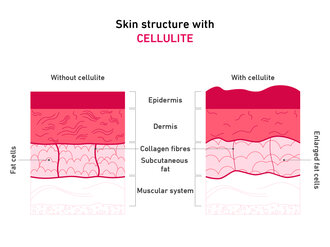Almost every woman is familiar with it: cellulite – or, as we also call it, orange peel skin. It's perfectly normal, but nevertheless many of us would like to have slightly smoother skin. And then there's this huge hype: collagen! But does it really help against cellulite? Dermatologist Dr. Katharina Medek has the answers for us.
The more wrinkles you have, the more this can naturally affect your well-being. Studies show that taking a collagen supplement goes deep and provides real improvements. So if you want to change something, collagen could be exactly what you need!
How does collagen help with cellulite?
Thick collagen fibres run through our skin, standing perpendicular to it. When fat cells in the hypodermis start to exert pressure on the connective tissue, they push the collagen fibres aside. This causes the fat cells to rise to the surface. The collagen fibres pull the skin downwards, while the fat cells bulge outwards – and voilà, the typical dimples and pits we know as cellulite appear.

When the collagen fibres are well cross-linked and elastic, the fat cells cannot push their way out as much – and just like that, cellulite becomes less visible. Taking collagen peptides daily ensures that the body produces more collagen I, elastin and fibrillin. This tightens and firms the skin, significantly reducing unsightly dimpling and dimpling.
And the best thing? There is also scientific evidence for it! One study shows that the severity of cellulite and the appearance of the skin improves significantly when 2.5 g of collagen is taken daily for 6 months. Another study even shows that collagen peptides boost collagen and elastin production after just 8 weeks.
Where does cellulite come from anyway?
The causes of cellulite are not yet 100% understood. But here are a few factors that could be responsible:
Hormone balance
The fact that it almost only affects women after puberty suggests that hormones play an important role. Oestrogen and other hormones control the distribution of fat in the body. During pregnancy, when taking the contraceptive pill or during hormone replacement therapy, the dimpling in the problem areas can become even more pronounced. Connective tissue also suffers damage during the menopause because collagen production decreases and collagen breakdown accelerates.
Unhealthy diet
Eating too many calories can lead to weight gain, which is a risk factor for cellulite. Sugar and carbohydrates in particular can have a negative effect.
Body weight
Cellulite also affects slim women, but a higher BMI statistically leads to more ‘orange peel skin’. So if you want to do something about the dimples, you should make sure you have a healthy body weight.
Water balance
Not drinking enough water? This can make denting even worse.
Lack of exercise
A lack of exercise can lead to weak connective tissue and visible cellulite.
Age
As we age, collagen production decreases, often leading to more cellulite. But don't worry – collagen supplementation can counteract this process!
Conclusion:
Collagen alone won't completely get rid of wrinkles, but it can improve skin firmness and significantly reduce the appearance of cellulite. For real, long-term results, you should take it regularly. And remember: a healthy lifestyle with a balanced diet and exercise plays a huge role in achieving firmer skin!
Frequently asked questions
Collagen improves skin firmness and elasticity. One study showed that a daily collagen intake of 2.5 g for six months significantly improved the appearance of cellulite and skin structure.
Type I collagen is particularly recommended for reducing cellulite. This type of collagen is found mainly in the skin, tendons and bones and helps to strengthen connective tissue. Hydrolysed collagen (collagen peptides) is particularly effective because it is more easily absorbed by the body.
Sources
Schunck M, Zague V, Oesser S, Proksch E. Dietary Supplementation with Specific Collagen Peptides Has a Body Mass Index-Dependent Beneficial Effect on Cellulite Morphology. J Med Food. 2015 Dec;18(12):1340-8
Gabriel A, Chan V, Caldarella M, Wayne T, O'Rorke E. Cellulite: Current Understanding and Treatment. Aesthet Surg J Open Forum. 2023 Jun 21;5: ojad050
Proksch E, Schunck M, Zague V, Segger D, Degwert J, Oesser S: Oral intake of specific bioactive collagen peptides reduces skin wrinkles and increases dermal matrix synthesis. Skin Pharmacol Physiol 2014;27:113–119
Pierard GE, Nizet JL, Pierard-Franchimont C: Cellulite: From standing fat herniation to hypodermal stretch marks. Am J Dermatopathol 2000;22:34–37









